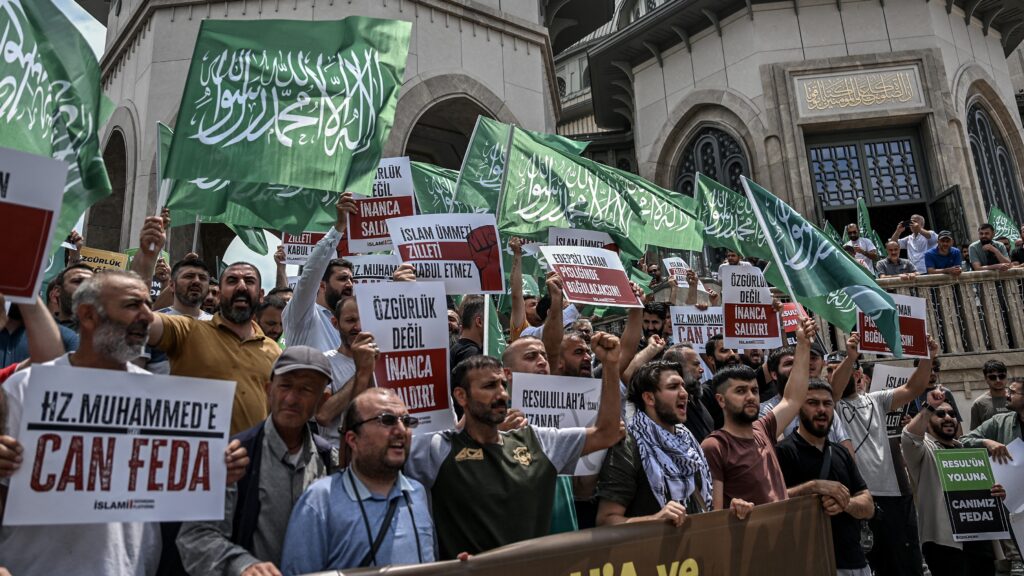A Turkish satirical magazine has sparked backlash across the country this week after publishing a controversial cartoon that many have interpreted as depicting the prophets Muhammad and Moses.
In its 26 June issue, Leman Magazine published an illustration showing two angelic figures hovering above a bombed city, presumably over Gaza. One figure says, “Salamun Aleykum,” while the other replies, “Aleyhem Shalom.”
Social media users and commentators widely identified the figures as representations of Muhammad and Musa (Moses), prompting widespread outrage across the country.
Many public and government figures, including Turkish President Recep Tayyip Erdogan, condemned the magazine, saying, “This is an open provocation hidden under the guise of humour. It is a heinous provocation.”
An investigation was launched into the magazine for “publicly insulting religious values”, and the editor-in-chief, the manager, the cartoonist, and the director of drawings were detained.
New MEE newsletter: Jerusalem Dispatch
Sign up to get the latest insights and analysis on
Israel-Palestine, alongside Turkey Unpacked and other MEE newsletters
Interior Minister Ali Yerlikaya announced on X that police had detained the cartoonist behind the controversial image, along with Leman Magazine’s graphic designer.
“The person named DP who made this vile drawing has been caught and taken into custody,” he said, adding: “These shameless individuals will be held accountable before the law.”
In his tweet, Yerlikaya also shared a video of the moment when the cartoonist was violently detained.
The magazine has denied that it was a depiction of the Prophet Muhammad, as stated in a lengthy thread shared on its social media account.
Parts of the thread read, “More than 200 million people in the Islamic world are named Muhammad. The artwork contains no direct reference to the Prophet Muhammad. The cartoonist intended to portray a Muslim individual killed by Israel, aiming to highlight the just cause of the oppressed Muslim population. There was absolutely no intention to insult or demean religious values. We reject the accusation directed at us, as there is no depiction of the Prophet Muhammad in the illustration.”
The magazine’s editor-in-chief, Tuncay Akgun, told AFP by phone from Paris that the image had been deliberately misinterpreted and was “not a caricature of Prophet Mohammed”. “We would never take such a risk,” he added.
Some people are defending the cartoon, saying it should be only a crime to depict the prophet in an Islamic state, and Turkey is a secular state.
Zaman dik durma zamanı, 19 Mart ne kadar niyetli ve organize ise bu işler de o kadar organize, hesaplı ve yapay. Türkiye’de kimsenin dine hakaret derdi yok, birileri sineğin yağından çıkarıp darbeye dayanak etmek istiyor. Dini kisvede siyasal darbe yaprak dindar seküler herkesin… https://t.co/ebIGH7uTFe
— Murat Somer (@murat_somer) July 1, 2025
Translation: No one in Turkey is interested in insulting religion; some are trying to extract meaning from nothing and use it as a pretext for a coup. Under the guise of religion, they aim to carry out a political coup and establish a regime where both devout and secular citizens are made subservient to others.
However, many people have disagreed and view the cartoon as an insult to Islam and Muslims.
Peygamberimiz Hz. Muhammed’e hakaret eden Leman isimli paçavranın kapısına kilit vurup yazanın, çizenin, basanın hayatını karartacak bir adalet istiyorum. pic.twitter.com/6MIoN6ZMpB
— Marginale (@themarginale) June 30, 2025
Translation: I want the kind of justice that will shut down the disgraceful publication named Leman, which insulted our Prophet Muhammad, and ruin the lives of those who wrote, drew, and published it.
Protests
Many people angry at the cartoon took to the streets on Monday to protest against it, calling for the magazine to be shut down. Many met in front of the Leman Magazine building and prayed there as an act of protest.
Some people marched at Taksim Square in downtown Istanbul, shouting, “down with secularism”, “long live Sharia”, which also created backlash online, as the Turkish government has long banned protests there, specifically including Feminist Night Marches, pride marches and May Day celebrations.
Pride için yürüyüş yapcaklar diye bir aydır taksim kapalı yasak var genel diyolar?? Ama şeriatçi militan olunca bi anda açılmış taksim https://t.co/H97Zvx8voo
— luctuosa (@Iuctuosa) July 1, 2025
Translation: They’ve kept Taksim closed for a month, saying there’s a general ban because of the Pride march. But suddenly, it’s wide open when religious hardliners are gathering.
An AFP correspondent reported that an Istanbul bar, a venue often frequented by Leman Magazine staff, was attacked by several dozen enraged protesters. This sparked angry scuffles with police, which quickly escalated into clashes involving 250 to 300 individuals.
In April, Amnesty International said that the “Turkish authorities must lift all restrictions on a planned May Day solidarity demonstration in Istanbul’s Taksim Square and allow people to gather peacefully in accordance with a ruling by Türkiye’s Constitutional Court.”
Meanwhile, Ozgur Ozel, the leader of the Turkish opposition party, said, “I won’t allow any disrespect toward the Prophet Muhammad, but I also won’t stand by while people are targeted and vilified over something that wasn’t disrespectful to begin with.”
With politicians getting involved and individuals being arrested, the impact of the issue has grown in the country, becoming increasingly viral on social media.
The controversy over Leman’s cartoon has once again brought to the surface the enduring tension between secular and religious worldviews in Turkey, a divide that has shaped the country’s politics for decades.
Since the early days of the Republic, secularism has been enshrined as a foundational principle, while conservative and religious movements have steadily gained ground, particularly under the rule of the Justice and Development Party since 2002.
Analysts have long pointed to what they describe as a deepening culture war over religion, press freedom and national identity.

